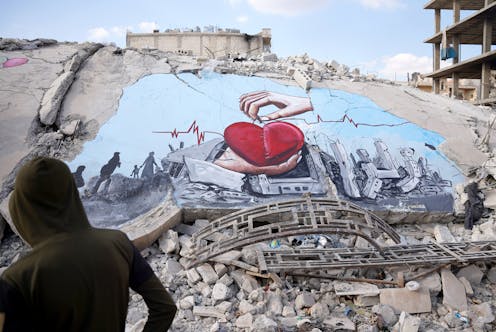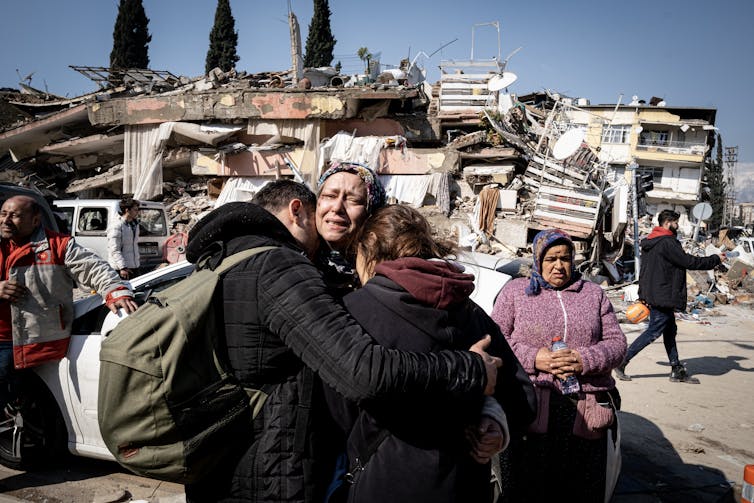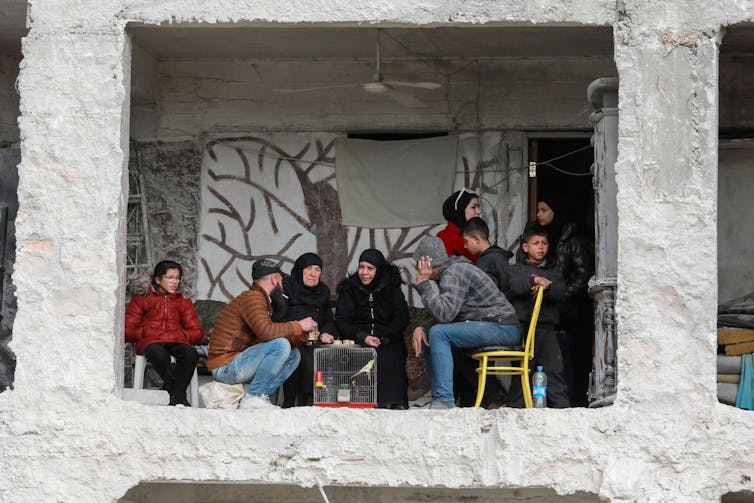
The earthquakes that struck southeastern Turkey and northern Syria in early February 2023 have killed at least 47,000 people and disrupted everyday life for some 26 million more.
Survivors of big disasters like these earthquakes – among the worst in the region’s history – certainly need food, water, medications, blankets and other goods. But they also need psychological first aid – that is, immediate mental health counseling along with support that strengthens their connections with their friends, relatives and decision-makers.
As scholars who study how disaster survivors benefit from preserving connections to people in their networks, we know that these social ties help with the recovery from traumatic events that cause significant upheaval.
But often in the rush to keep survivors fed, warm and housed, we’ve observed that the flow of support that focuses on meeting their psychological needs falls short of what’s needed.
Emergency response underway
The Turkish government agency responsible for disaster management – the AFAD – focuses strongly on the delivery of tents, medical care and physical aid. And the few nongovernmental organizations providing mental health care, such as the Maya Foundation and Turkish Psychological Association, have received less than 10% of the donations channeled through the Turkey Earthquake Relief Fund.
Many international aid groups, private companies and NGOs have launched campaigns to support search and rescue operations and response and recovery through disaster diplomacy. The United Nations invited its member states to raise US$1 billion to support aid operations. The U.S. is providing more than $100 million in aid.
All this assistance is funding emergency response efforts and humanitarian aid that largely consists of food, medicine and shelter in the area.
The Turkish government has announced it will begin building 30,000 homes in quake-hit areas in March and will give cash aid to those affected.

Psychological aspects of disasters
Research conducted after a wide variety of catastrophes has shown that mental health problems become more common after these events. Many survivors experience anxiety, depression and post-traumatic stress disorder because of everything they have been through.
One reason for this is that disasters can cut people off from their routines and sever access to the sources of emotional support they previously relied on. Often moved to emergency shelters, and away from their doctors, neighbors and friends, survivors – especially those without strong networks – regularly experience poor mental health.
Further, when there are many casualties after major disasters of any kind, families may have lost loved ones and still not have a gravesite at which they can mourn. Within seven weeks of Hurricane Katrina in 2005, for example, nearly half of the residents of New Orleans surveyed by the Centers for Disease Control and Prevention had PTSD symptoms.
An important lesson we’ve drawn from researching what occurs after disasters is that robust social networks can soften some of the blows from these shocks. Even after someone loses a home and a sense of normalcy, staying in close touch with family and friends can minimize some of the sense of loss.
People who are pushed out of their routines but manage to remain connected to their neighbors – who are often going through the same ordeal – tend to have lower levels of PTSD and anxiety. Their friends and relatives can provide emotional support, help them stay informed, and encourage the use of mental health treatment and outside help when it’s needed.
One of us participated in a research team that surveyed nearly 600 residents of a town located near the Fukushima Daiichi power plant after the nuclear meltdowns in March 2011. More than one-fourth of these survivors of the catastrophe had PTSD symptoms. Those with strong social networks, however, generally had fewer mental health problems than other survivors with weaker connections to their friends and loved ones.
Another study of Japan’s Great Eastern Earthquake and tsunami in 2011 that one of us took part in showed that survivors of that disaster with stronger social ties recovered more rapidly and completely following a disaster.

4 strategies that can help
In our view, relief organizations that operate in Turkey and Syria and government aid agencies need to focus and spend more on mental health priorities. Here are four good ways to accomplish this:
Include psychologists, therapists, social workers and other mental health professionals in the mix of aid workers who arrive immediately after disasters to begin group and individual therapy.
Ensure that local faith-based organizations and spiritual leaders play key roles in the recovery process.
Get as many public spaces, such as cafes, libraries and other gathering spots as possible, up and running again. Even virtual get-togethers using Zoom or similar software can help maintain connections with displaced friends and loved ones – as long as survivors have working cellphone service, at a minimum.
Disaster recovery efforts should make communications technology a high priority. In addition to spending on food, tents, blankets, cots and medical supplies, we recommend that basic disaster aid should include access to free phone calls and Wi-Fi so that people whose lives have been upended can stay in contact with far-flung friends and loved ones.
Given the likelihood of more large-scale disasters in the future, we believe that it’s essential that relief efforts emphasize work that will strengthen the mental health and social networks of survivors.
The authors do not work for, consult, own shares in or receive funding from any company or organization that would benefit from this article, and have disclosed no relevant affiliations beyond their academic appointment.
This article was originally published on The Conversation. Read the original article.







